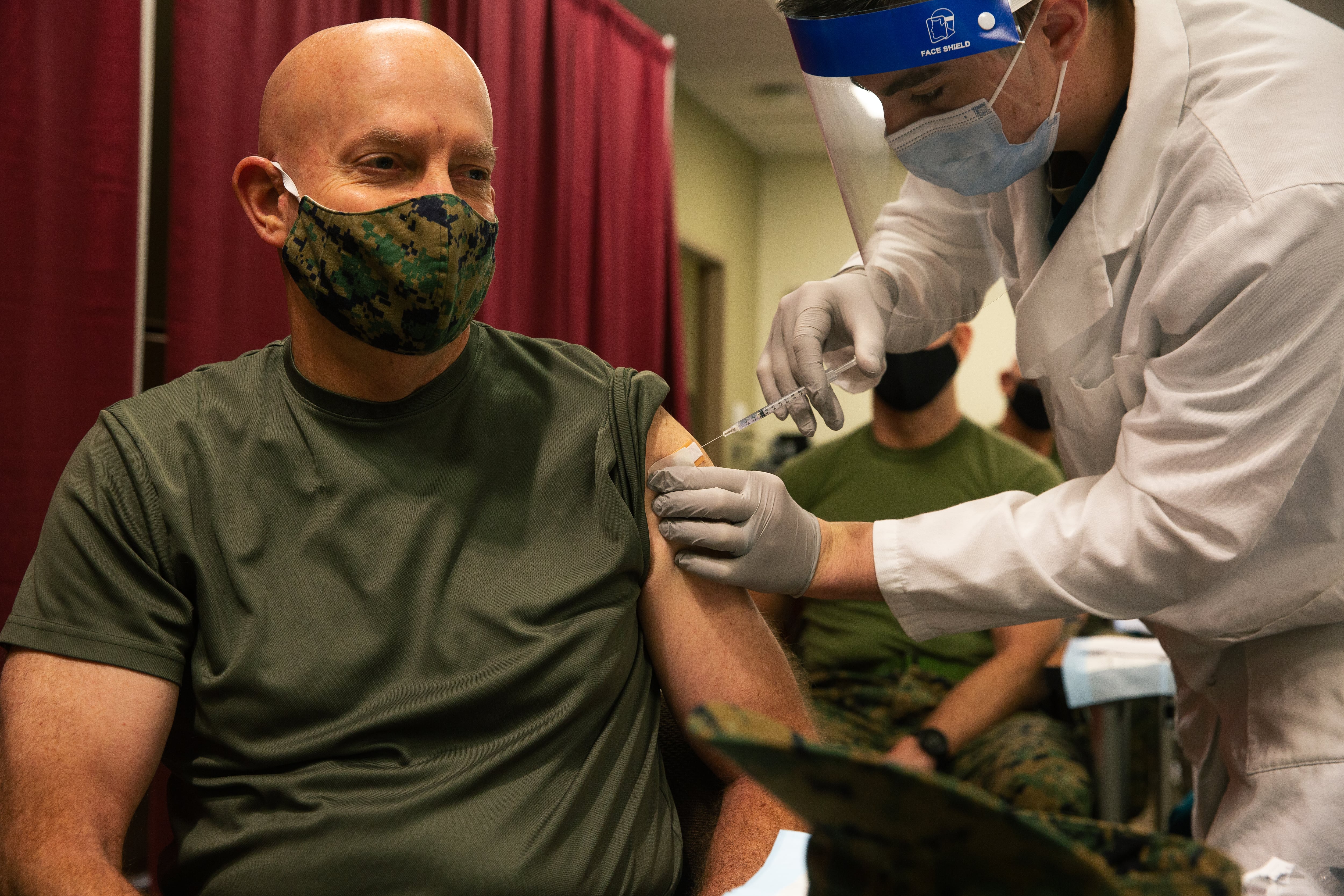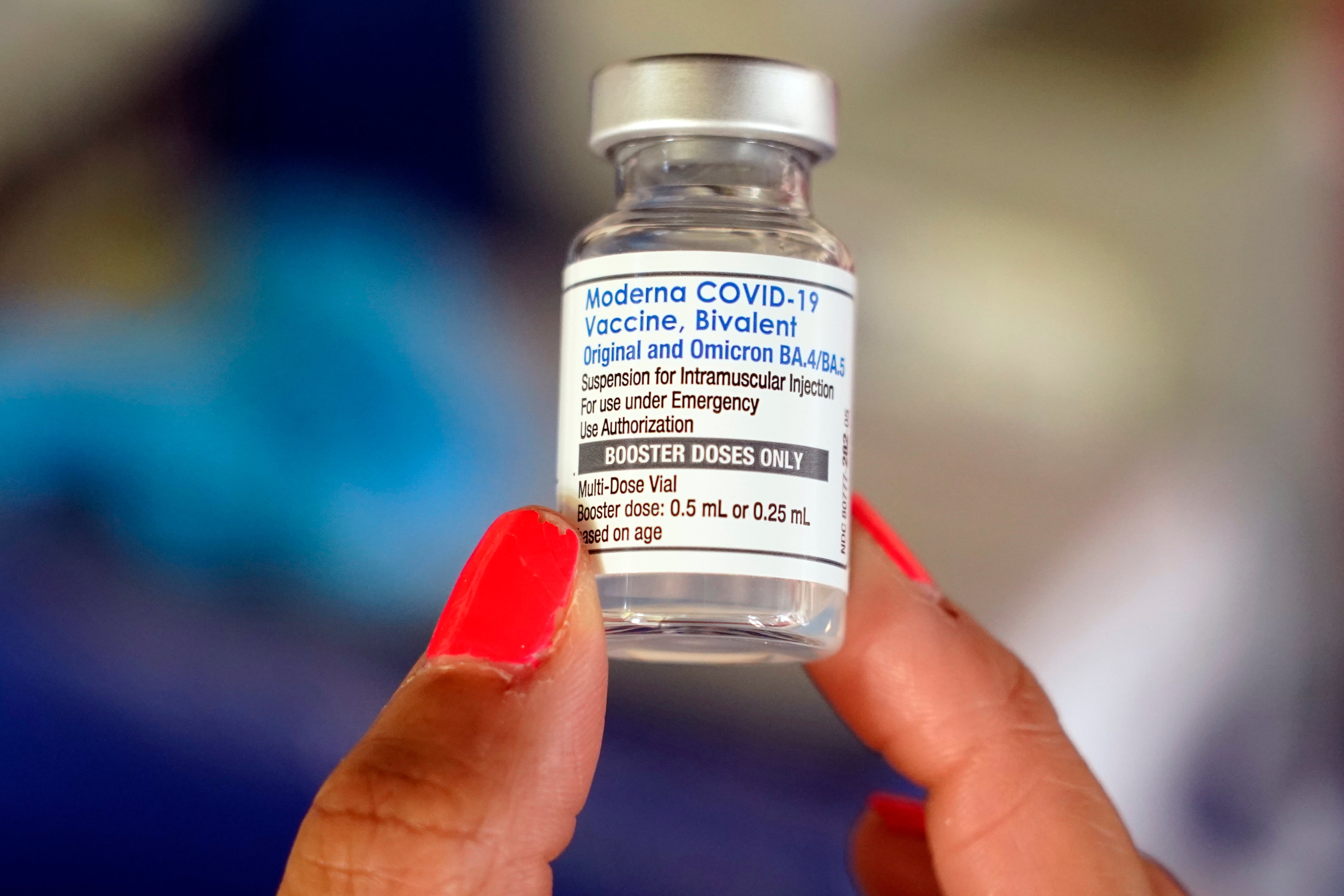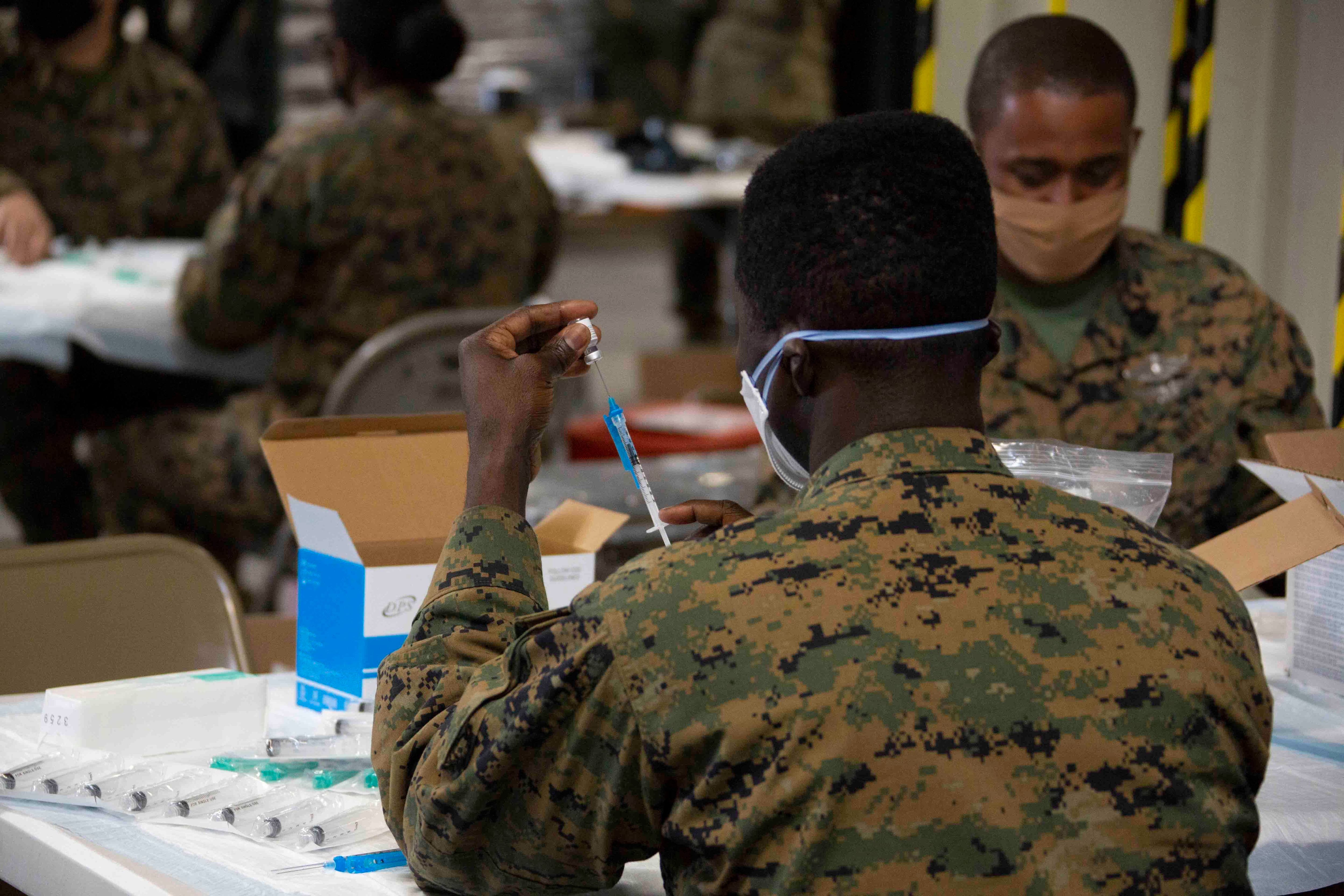The Marine Corps and lawyers for Marines who were denied religious accommodations that would have excused them from the COVID-19 vaccine mandate have been gearing up for a legal battle in January that could reshape the Corps’ accommodation process, but Congress appears set to step in before then.
Fifteen Marines, along with troops from other branches and contractors, filed a lawsuit in 2021 saying that being forced to get vaccinated violated their religious beliefs.
A federal district judge in Florida in August issued a preliminary injunction blocking the Corps from dismissing Marines who have been denied appeals of religious accommodations from the service’s vaccine mandate.
But that halt on dismissals is temporary. The upcoming trial, set for Jan. 23, would determine whether it will become permanent if the vaccine mandate is still in place then.
Meanwhile, the newest iteration of Congress’ annual defense bill, passed by the House on Thursday, would force the Pentagon to scrap its vaccine mandate, potentially rendering moot the lawsuit filed by Marines who objected to the vaccine on religious grounds. The White House has decried the proposed rollback of the mandate but hasn’t said whether President Joe Biden would veto the bill if Congress passes it.
As of the end of November, 3,740 Marines had made requests for religious exemptions from the vaccine, and only 23 of those requests had been granted, according to a COVID-19 update from the Marine Corps. And 3,717 Marines already have been separated from the Corps for refusing the vaccine.
For now, as they await congressional and legal developments, many of the approximately 1,150 Marines who have filed appeals asking the Marine Corps for religious exemptions are in limbo, as Marine Corps Times previously reported.
Even absent a mandate, the Marine commandant said Wednesday that the Corps would “keep pushing” Marines to get vaccinated, characterizing the shot as important for military readiness.
Legal challenge to the mandate
A little more than a month after the COVID-19 vaccine mandate came down in September 2021, troops across the branches sought an injunction that would halt their dismissals from the military.
A court order in June broke up the case into multiple cases by service.
At issue in the Marine Corps suit, filed by 15 Marines, is whether the religious accommodation process violates the Religious Freedom Restoration Act, a 1993 law that limits the government’s ability to place burdens on religious exercise.
Florida federal judge Steven Merryday in August granted a preliminary injunction, temporarily barring the Marine Corps from dismissing the Marine plaintiffs and other Marines who had filed timely appeals of denied religious accommodations. The injunction doesn’t apply to Marines with nonreligious objections to the vaccines.
“Because the record reveals the substantial likelihood of a systemic failure by the Marine Corps to discharge the obligations established by RFRA, a classwide preliminary injunction is warranted to preserve the status quo, to permit the full development of the record without prejudice to the plaintiffs, and to permit both a trial and a detailed, fact-based resolution of the controlling issues of fact and law,” Merryday wrote.
Merryday observed that the few Marines who did receive religious accommodations were about to retire.
One prior-enlisted officer, who is part of the class of Marines protected by the injunction and talked on the condition of anonymity to speak freely about his situation, said he has been in the Marine Corps for more than 18 years.
A Christian, he said he denied the vaccine because it seemed similar to the mark that a beast, conveying an allegiance to Satan, in Chapter 13 of the Bible’s Book of Revelation forces people to bear in worship of it.
“For me personally, I don’t believe that it’s the mark of the beast,” he said, “but I do believe it’s taking us on a road for that and accepting this vaccine is going to make things easier in the future to continue down towards ultimately accepting that mark.”
He said he was also concerned about news stories he has seen about people dropping dead after taking the vaccine. (The Centers for Disease Control and Prevention has found nine deaths causally linked to COVID-19 vaccine, specifically the Johnson & Johnson vaccine, out of more than 653 million vaccine doses administered.)
The officer said that a promotion he had expected to receive is on hold because of his resistance to the vaccine mandate. He said he can’t go on exercises overseas, and he is in a new billet that isn’t commensurate with his experience.
“It’s been frustrating, but I’ve been fortunate and blessed that I still have a position, I still have a job, I’m still getting paid and my family has been taken care of,” he said.
Another Marine officer who is part of the class projected by the injunction and spoke on the condition of anonymity said he also objected to the vaccine because of his Christian faith.
He told Marine Corps Times that he had been preparing over the summer to appear before a board of inquiry that could have dismissed him from the Corps. But the injunction came down with a week to spare.
He said is now working in what he called a “made-up billet” and not getting the transfer orders that he otherwise would have.
The officer said his objection to the vaccine arose from communication he had with Jesus Christ through prayer.
“Once he speaks, it’s my duty to listen, and my duty is to God and then to country and Corps,” he said. “The Marine Corps once knew a little bit more about that.”
For now, a trial is set for Jan. 23 in Tampa, Florida, before Merryday. If the mandate is still in place — a prospect that has grown increasingly unlikely — the trial could determine whether the Corps can ever reinstate its dismissals of Marines who declined the vaccine on religious grounds.
Plaintiffs in the lawsuit argue that the Corps has denied requests for accommodations en masse rather than considering them individually.
“The review’s basically a rubber-stamp sham,” Mat Staver of Liberty Counsel, which is representing the plaintiffs, told Marine Corps Times.
Staver noted that the Marines who object to the vaccine come from a variety of faiths, including Islam and Christianity.
“The thing that holds them together is they have a deep love for God and they have a deep love for the country,” he told Marine Corps Times. “Most of them have been deployed in many situations where they put their lives on the line. They are deeply loyal to the United States Marines, but they are also deeply hurt by the United States Marines and the Department of Defense.”
In legal filings, the Marine Corps has denied that the accommodations process is a sham and has defended the mandate.
As the Marine Corps put it in a November 2021 filing in the case, “Vaccine requirements have been commonplace in the military for generations and are critical to reducing infectious disease morbidity and mortality in the armed forces where service members must routinely operate in close quarters.”
The Justice Department, which is representing Defense Department officials in this lawsuit, did not respond to a Marine Corps Times request for comment.
The contentious vaccine mandate
When COVID-19 vaccines initially became available to Marines on an optional basis in spring 2021, nearly 40% of Marines declined them, according to Pentagon data.
Approved COVID-19 vaccines have been shown by the Food and Drug Administration and the Centers for Disease Control and Prevention to be a safe and effective way to prevent serious illness and death and to limit, though not eliminate, the spread of the disease.
But about one in four American adults remains unvaccinated, according to the Kaiser Family Foundation, with some citing religious objections.
Some Catholics and evangelical Christians have raised concerns about the vaccines, which were developed and tested using cell lines grown from fetuses aborted decades ago — a common practice in creating new vaccines and drugs.
The vaccines themselves do not contain any fetal cells. Pope Francis, along with many other religious leaders, has been a strong proponent of the vaccines, including the COVID-19 vaccine, as an “act of love” for others.
The Pentagon in August added the Novavax vaccine, which wasn’t tested using fetal cells, as an option for service members.
Though there has been a 1-percentage-point increase in the Corps’ overall vaccination rate from August to December, it’s unclear the specific reason for the bump.
Marine Corps spokesman Capt. Ryan Bruce told Marine Corps Times, “COVID-19 is a readiness issue.”
“The speed with which the disease transmits among individuals has increased risk to our Marines and the Marine Corps’ mission,” he said in a statement. “We are confident the vaccine protects our Marines, our communities, and the Nation.”
Service members are required to take several other vaccines upon entering the military, per Defense Department guidance.
The Marine Corps announced a vaccine mandate on Sept. 1, 2021 — a week after the FDA approved the Pfizer-BioNTech vaccine and the Pentagon ordered all service leaders to implement mandates. The Corps previously had said it wouldn’t require the shots as long as they were under an emergency-use authorization as opposed to full approval.
In its mandate guidance, the Corps said it would offer religious and medical exceptions to Marines who demonstrated they needed them. After first demonstrating the sincerity of their beliefs to a chaplain, Marines had to submit their requests for an exemption so the Marine Corps could review them.
Under the Corps’ rules, Marines who refused the COVID-19 vaccine without an approved medical or religious accommodation were separated unless they had an appeal pending.
These Marines could receive a general discharge under honorable conditions rather than an honorable discharge. They didn’t receive involuntary separation pay and in some cases lost GI Bill benefits or the ability to transfer them to dependents.
Unvaccinated Marines who remain in the force aren’t allowed to deploy worldwide and are “reassigned, locally, to billets which account for health risks to the unvaccinated Marine and those working in proximity to the Marine,” according to an October 2021 message to Marines.
The Pentagon inspector general in June raised concerns that the services may have been issuing blanket denials of requests for religious accommodations.
Republicans in Congress have sharply criticized both the mandate and the Marine Corps’ implementation of it. Now, House Republicans, with concessions from Democrats, have managed to put into the annual must-pass defense authorization bill a provision ending the mandate across the branches.
“The vaccination mandate has forced our nation’s young patriotic men and women to choose between their faith, their medical autonomy and their careers,” Sen. Rand Paul, R-Kentucky, said at a press conference Nov. 30. “At a time when the military is struggling to meet targets for recruitment, the administration is firing soldiers we invested in and trained.”
The Pentagon and the White House have continued to defend the mandate in spite of pressure from Congress.
Marine commandant Gen. David Berger acknowledged during a panel discussion on Saturday that the vaccine mandate was hampering recruitment in some areas of the country, especially the South. But he said vaccinating troops was necessary for force readiness.

“We haven’t had anybody die [of COVID] since April,” Berger said of the Marine Corps. “Zero. Units go out 100% vaccinated, ready. It’s critical to make sure we can do our job.”
The commandant said at a Defense Writers Group event on Wednesday that, as a uniformed officer, he wouldn’t wade into the political back-and-forth with Congress. But he stated that the Marine Corps would “keep pushing” its Marines to get vaccinated even if the mandate ends.
“Marines know that when their leadership says, ‘You need to do something because that’s important to warfighting and your own health,’ the politics part isn’t a part of that,” Berger said.
RELATED

Navy Secretary the Honorable Carlos Del Toro said Tuesday that repealing the vaccine mandate would create “almost two classes of citizens in our services: those that can’t deploy and those that can deploy,” as Defense One reported.
“And that creates all sorts of problems,” Del Toro said.
The case challenging the Corps’ religious accommodation process is Colonel Financial Management Officer, et al. v. Lloyd Austin (8:22-cv-01275-SDM-TGW).
Irene Loewenson is a staff reporter for Marine Corps Times. She joined Military Times as an editorial fellow in August 2022. She is a graduate of Williams College, where she was the editor-in-chief of the student newspaper.





